The journey of Ibn Fadlan... Date or fiction?
Ahmed Ibn Fadlan Real character
Show key points
- Ahmed Ibn Fadlan was a real historical figure, not just a fictional character portrayed in "The Thirteenth Warrior."
- In 921 AD, the Abbasid Caliph Al-Muqtadir Billah commissioned Ibn Fadlan to travel to the Saqalaba to teach Islam and help fortify their land.
- His journey documented valuable and previously unknown insights into the cultures of the Turks, Saqalaba, Khazars, and Vikings.
- ADVERTISEMENT
- Although the trip aimed to deliver funds for building fortresses, Ibn Fadlan was unable to secure the money during his extended stay in Bukhara.
- The details of his travels became widely recognized not during his time, but later when European scholars rediscovered his writings.
- There are sections in Ibn Fadlan’s message whose authenticity is questioned due to differences in writing style and possible later additions.
- Ibn Fadlan vividly described unique customs and rare creatures, offering a rare glimpse into unfamiliar lands and societies.
When I was ten years old, I first saw "The Thirteenth Warrior" starring international actor Antonio Banderas who played the role of Ahmed Ibn Fadlan, an Arab traveler who documented his exciting journey to the lands of the Turks, the Saqalbas (Volga Bulgars), the Khazars and the Vikings in a book known as "The Letter of Ibn Fadlan". I did not know at the time that "Ahmed Ibn Fadlan" is a real person and I was surprised by the great impact left by this traveler and the importance of his trip, as what "Ahmed Ibn Fadlan" wrote in his book that tells the story of that journey is the first historical source documenting the life of the Saqlaba, Khazars and Vikings nearly 500 years before all European historians.
Recommend
Ahmed Ibn Fadlan Real character
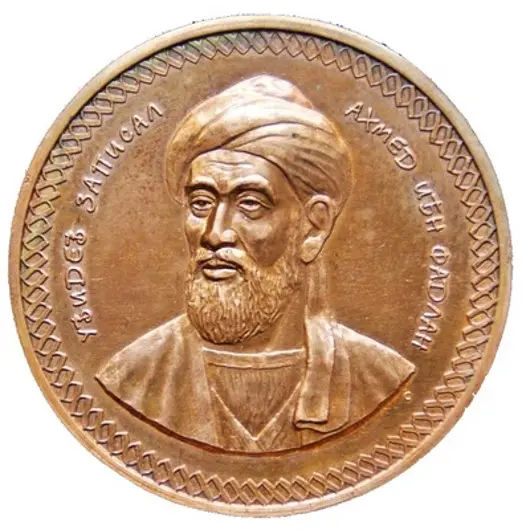
When I was ten years old, I first saw "The Thirteenth Warrior" starring international actor Antonio Banderas who played the role of Ahmed Ibn Fadlan, an Arab traveler who documented his exciting journey to the lands of the Turks, the Saqalbas (Volga Bulgars), the Khazars and the Vikings in a book known as "The Letter of Ibn Fadlan". I did not know at the time that "Ahmed Ibn Fadlan" is a real person and I was surprised by the great impact left by this traveler and the importance of his trip, as what "Ahmed Ibn Fadlan" wrote in his book that tells the story of that journey is the first historical source documenting the life of the Saqlaba, Khazars and Vikings nearly 500 years before all European historians.
Reason for the trip
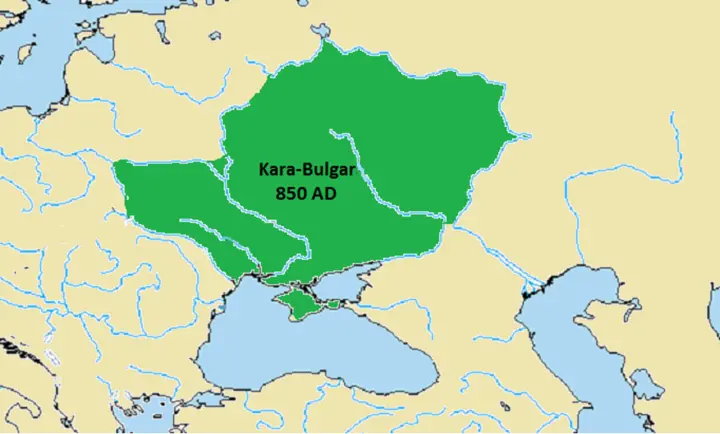
In 921 AD, the Abbasid Caliph was the Commander of the Faithful, "Al-Muqtadir Billah" in his capital, "Baghdad", when he received a letter from the King of the Saqlaba, "Almash bin Shilki" declaring his Islam and asking the Caliph to send him someone who knows Islam and build him a mosque and erect a platform for him to invite people to Islam, and he also asked him to build him a fortress to defend his land from the King of the Khazars, who imposed heavy taxes on them and was marrying the daughters of the Saqlabah against their will, the Caliph answered him to what He asked and entrusted "Ahmed Ibn Fadlan" to travel to the King of Saqlaba and teach its people Islam, so "Ibn Fadlan" set off from Baghdad loaded with gifts until he reached the capital of the Saqlaba "Bulgaria", which is located 30 kilometers from the Volga River, and read him the message of the Abbasid Caliph "Al-Muqtadir Billah" and gave him those gifts that he carried to him, but unfortunately he could not deliver to him the money that was supposed to be used by King "Almesh" in building forts that help him protect his people from the control of The Khazars on his state to the extent that the son of the king of the Saqlaba himself was a captive of the Khazars.
Details of the trip to Bukhara
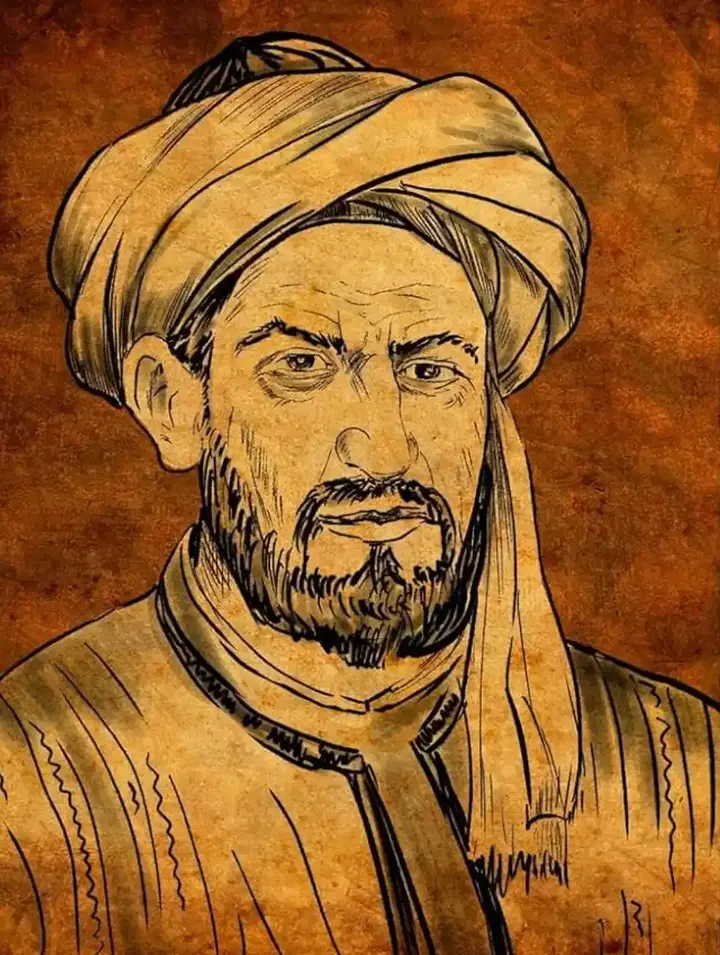
Ibn Fadlan did not talk much about himself in his message, but he described everything he saw in his exciting trip, which lasted nearly a year, the Arabs did not care much about this trip, but European orientalists gave it great attention because it contained social and historical information that had never been mentioned by any traveler or historian before "Ibn Fadlan", and the message included some customs and traditions of people no one knew anything about them before the date of that trip, and the strange thing is that the message did not talk about The journey back to Baghdad led many to conclude that Ibn Fadlan did not return and that he preferred to live in the Volga Kingdom of Bulgaria under King Almesh, who was eager to learn everything about Islam, and changed his name to Ja'far bin Abdullah.
Ibn Fadlan's trip to the country of the Bulgarians was full of strange events, and his message itself has been manipulated with its sources, and there are those who say that there are chapters that have been added to the book after the death of "Ibn Fadlan", which mentions that he did some reprehensible acts that he was not known to come up with as he was famous for piety and righteousness, and the style of writing in the last chapter is different from the style of the rest of the message and talks about the passage of Ibn Fadlan from the city of "Attil", the capital of the Khazar Empire, an event that is not It has no evidence.
Itinerary
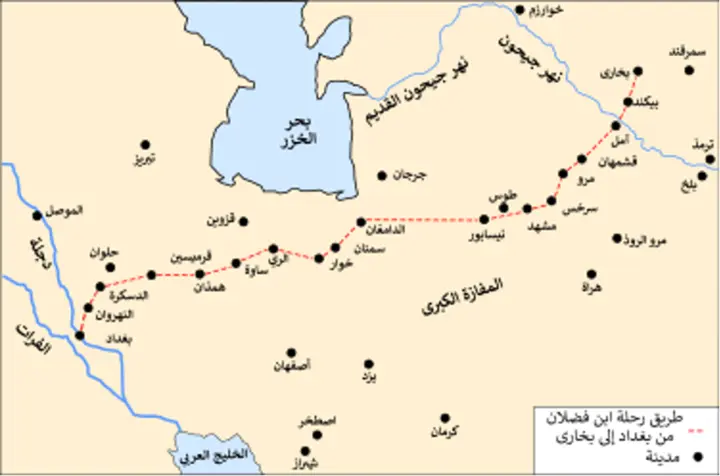
Ibn Fadlan" set off on the first trip from "Baghdad" towards the city of "Bukhara" to receive the money that was supposed to be sent to the King of the Saqlabah to be used in the construction of forts, as that amount amounted to 4000 gold ounces, and the goal was to avoid passing through the territory of the Khazar state so as not to reach information to the King of the Khazars about the alliance that is being created between the King of the Saqlabah and the Abbasid state, but "Ibn Fadlan" waited long to receive that money and remained in the city of "Bukhara" nearly three months which was the capital of the Samanid state at the time, but that money never reached him.
After that, "Ibn Fadlan" set off on his journey towards the capital of Saqlabah (Bulgaria), which is called in our time "Kazan", which is the capital of the Russian region of "Tatarstan". Ibn Fadlan's "choice" for this route despite the existence of a shorter route was for two reasons, the first was to avoid passing through the territory of the Khazar Empire controlled by the Jews at this time, and the other reason was the ruggedness of the mountain road that ran through the Caucasus Mountains, but the journey was difficult anyway.
Why wasn't Ibn Fadlan's message famous at the time?
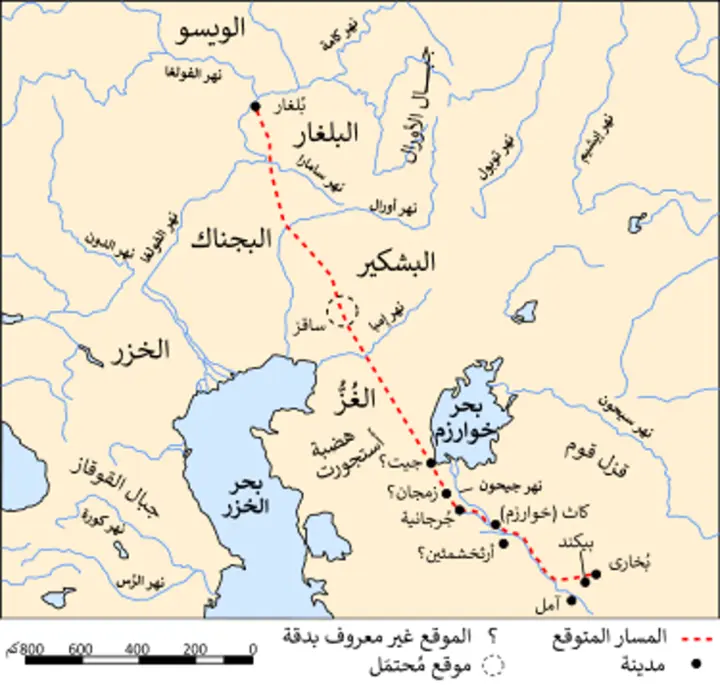
The territory of the Kingdom of the Bulgarians was very far from the center of the Abbasid state, and there was no great interest from the Arabs in this region at this time, and the extreme cold of these places was not encouraging to travel to them and the road itself was not safe, so the journey of "Ibn Fadlan" remained of little importance until it was rediscovered by European orientalists when they found in it interesting details about the customs and traditions of European peoples and races who were not amateurs of blogging, and there are events that have been witnessed by " Ibn Fadlan" and wrote about it and no one else witnessed it, neither before nor after, such as the rituals that the Vikings performed when one of them died,
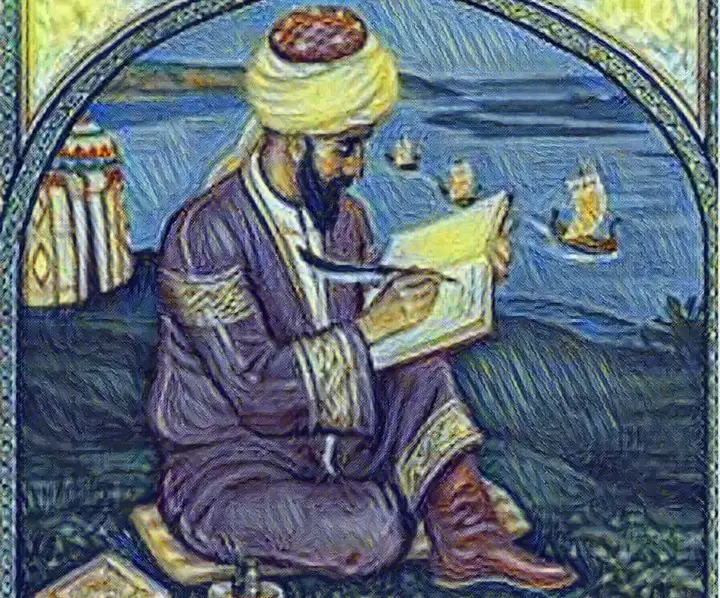
We conclude with one of Ibn Fadlan's interesting sayings in his description of an animal that the Arabs have never seen before:
"Near a vast desert, they mention that there is an animal without a camel in caper and above an ox, its head is the head of a camel and its tail is the tail of an ox, and its body is the body of a mule, and its hooves are like the hooves of an ox, it has in the middle of its head one thick round horn, the higher it is hammered until it becomes like the teeth of a spear, from which it is five cubits to three cubits, more and less, grazing leaves.








